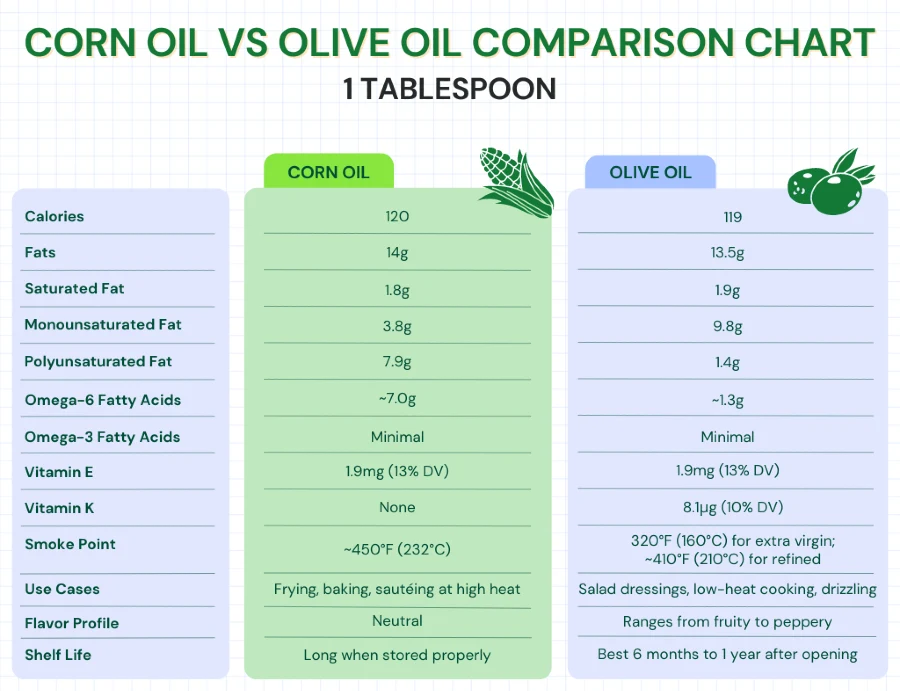In the realm of cooking oils, the debate between corn oil and olive oil is as heated as a sizzling skillet. Both oils claim their stakes in kitchens across the United States, each backed by a trove of culinary traditions and health research. But which one truly reigns supreme? Let’s embark on a flavorful journey to uncover the truth.
Corn Oil: A Staple of American Kitchens
Corn oil, derived from the corn kernels‘ germ, shines in its versatility and high smoke point. Ideal for high-heat cooking like frying and sautéing, it’s a go-to for chefs who demand performance without a dominating flavor. But corn oil is more than just a culinary workhorse. Nutritionally, it boasts a high content of polyunsaturated fatty acids, including essential omega-6 fats, and is a modest source of vitamin E – an antioxidant that helps protect against free radicals.
Despite its virtues, corn oil’s high ratio of omega-6 to omega-3 fatty acids raises eyebrows among nutritionists concerned about the modern diet’s imbalance of these essential fats. Excessive omega-6 intake, prevalent in vegetable oils like corn, soybean oil, and sunflower oil, can tip the scales towards inflammation, underscoring the need for balance with omega-3 rich foods.
Corn Oil: Essential Facts
- Type of Oil: Vegetable oil derived from corn kernels.
- Use Types: Ideal for frying, baking, and sautéing due to its high smoke point. Perfect for recipes requiring high heat.
- Average Prices: Generally affordable, varies by brand and volume. Always priced lower in the grocery store than olive oil.
- Nutritional Info: Rich in polyunsaturated fats, including omega-6 fatty acids. Contains vitamin E and phytosterols that can help lower LDL cholesterol.
- Cooking Methods: Versatile; can be used in almost any cooking method, especially where neutral flavor is desired.
- Health Benefits: Study participants in clinical trials have shown that corn oil can improve heart health by affecting cholesterol levels. However, it should be consumed in moderation due to its high omega-6 content.
- Storage: Best kept at room temperature, away from direct sunlight, to maintain its quality.
- Smoke Point: Around 450°F (232°C), making it suitable for higher temperatures cooking.
- Consumption Recommendations: A single tablespoon of corn oil can be a significant source of unsaturated fat content for daily dietary needs.
Olive Oil: The Heart-Healthy Hero
Olive oil, particularly the extra-virgin variety, is celebrated for its heart-healthy profile. Packed with monounsaturated fats and polyphenols, it stands out as a champion of cardiovascular wellness. The American Heart Association nods to olive oil’s efficacy in lowering bad cholesterol (LDL) while elevating good cholesterol (HDL), thereby slashing the risk of heart disease.
Beyond its health halo, olive oil is a culinary treasure. With a lower smoke point than corn oil, it’s best reserved for dressings, dips, and low to medium heat cooking, where its rich, varied flavors can truly shine. From salad dressings to a simple drizzle over grilled vegetables, olive oil adds a touch of Mediterranean magic to any dish.
Olive Oil: Essential Facts
- Type of Oil: A key type of oil in the Mediterranean diet, pressed from olives. Known for extra-virgin and virgin grades.
- Use Types: Best used for salad dressings, dips, and low heat cooking due to its rich flavor and lower smoke point compared to corn oil.
- Average Prices: Can be more expensive than corn oil, particularly extra-virgin olive oil, due to the pressing methods without chemical solvents.
- Nutritional Info: High in monounsaturated fats, particularly oleic acid. Contains antioxidants like vitamin K and polyphenols.
- Cooking Methods: Ideal for dressing, drizzling, and gentle sautéing. Not recommended for high temperature frying due to different smoke points.
- Health Benefits: Supports heart health by lowering low-density lipoprotein (LDL) cholesterol and raising HDL cholesterol. Preliminary scientific evidence suggests benefits in reducing the risk of chronic diseases.
- Storage: Should be stored in a cool, dark place to preserve its unsaturated fat content and antioxidant properties.
- Smoke Point: Ranges from 320°F (160°C) for extra-virgin to around 410°F (210°C) for refined olive oil, indicating less suitability for high heat cooking.
- Consumption Recommendations: Incorporating a similar amount or no more than two tablespoons of olive oil into daily meals, with most doctors recommending one tablespoon daily, can contribute to a heart-healthy diet.
Both oils offer unique benefits and uses in the kitchen. Choosing between corn oil and olive oil depends on your cooking needs, health goals, and flavor preferences. Each has its place in a balanced diet, contributing to healthy men and women’s nutritional needs. When shopping in the cooking oil aisle, consider these key points to select the best oil for your culinary creations and health objectives.
Comparison Chart Notes:
- Calories and total fat are similar, but the types of fats differ significantly, with olive oil being richer in heart-healthy monounsaturated fats.
- Saturated Fat content is nearly the same, making both oils comparable from a dietary fat quality perspective.
- Polyunsaturated Fat is higher in corn oil, which includes a significant amount of omega-6 fatty acids, whereas olive oil is lower in polyunsaturated fats and higher in monounsaturated fats.
- Both oils provide Vitamin E, an important antioxidant, but olive oil also offers Vitamin K, beneficial for blood clotting and bone health.
- The Smoke Point of corn oil is higher, making it more versatile for various cooking methods, especially those involving high heat.
- The Flavor Profile of olive oil adds a distinct taste to dishes, while corn oil’s neutrality makes it a versatile background fat.
Nutritional Nuance and Culinary Flexibility
When pitting corn oil against olive oil, it’s clear that both have their rightful place in a balanced diet. Corn oil’s neutral flavor and higher smoke point make it suited for baking and frying, where olive oil’s robust taste and health benefits are perfect for salad dressings and gentle sautéing.
Yet, nutritionally, olive oil pulls ahead with its lower risk of heart disease and antioxidant properties. The presence of vitamin E in both oils contributes to their antioxidant capacity, though olive oil’s additional polyphenols offer a broader protective spectrum against cardiovascular disease.
The Verdict: Balancing Taste, Health, and Cooking Needs
Choosing between corn oil and olive oil isn’t a zero-sum game. It’s about balancing your culinary needs, health goals, and taste preferences.
- For high-temperature cooking, corn oil’s high smoke point and neutral oil profile stand out.
- For those prioritizing heart health and flavor, olive oil, with its monounsaturated fatty acids and rich taste, is unparalleled.
Embracing Variety for Optimal Health
In the broader landscape of cooking oils, variety is key. Incorporating a mix of oils, such as canola oil, coconut oil, and avocado oil, alongside corn and olive oils, can diversify your intake of fatty acids and nutrients. Each oil has its unique profile of healthy fats, vitamin E, and smoke points, offering versatility and nutritional benefits.
FAQs: Your Questions Answered
- Which oil is best for frying at high temperatures?
Corn oil is ideal for high heat cooking due to its high smoke point. This makes it a better choice for frying compared to olive oil.
- Can I use olive oil for baking?
Yes, olive oil can be used for baking, especially extra-virgin olive oil for its flavor. However, for a neutral flavor, consider corn oil or canola oil.
- Is corn oil or olive oil better for heart health?
Olive oil, particularly extra-virgin olive oil, is better for heart health due to its high monounsaturated fats and polyphenols, which help lower LDL cholesterol and maintain healthy cholesterol levels.
- How do these oils affect cholesterol levels?
Olive oil is known to help reduce LDL cholesterol (bad cholesterol) and increase HDL cholesterol (good cholesterol), thereby improving total cholesterol levels. Corn oil, rich in polyunsaturated fats, can also support healthy cholesterol but is more effective when consumed in moderation due to its higher omega-6 content.
- What are the health benefits of consuming corn oil daily?
Consuming moderate amounts of corn oil can provide vitamin E and omega-6 fats, which are essential for skin health and inflammatory responses. ACH Food Companies‘ clinical trials have shown possible benefits in improving heart health by lowering diastolic blood pressure.
- Can these oils be part of a weight maintenance diet?
Yes, both oils can be part of a weight maintenance diet when used in moderation. The total number of calories from fat should be considered in the context of your overall diet.
- What’s the nutritional difference between corn oil and extra-virgin olive oil?
Extra virgin olive oil is higher in monounsaturated fats and polyphenols, making it a healthier option for reducing heart disease risk. Corn oil contains more polyunsaturated fats and vitamin E, but it’s essential to balance omega-6 intake with omega-3 fats for optimal health.
- Are there cooking oils with higher smoke points than corn oil?
Yes, oils like peanut oil and sesame oil have higher smoke points, making them suitable for very high-temperature cooking. However, corn oil remains a popular choice for its neutral flavor and versatility.
- How do plant sterols content in these oils impact health?
Both corn oil and olive oil contain plant sterols, which can help lower cholesterol levels. Corn oil tends to have a higher sterol content, offering a possible benefit in managing cholesterol levels.
- What’s the role of fatty acids in these oils?
Fatty acids, such as oleic acid in olive oil and linoleic acid in corn oil, play crucial roles in health. Oleic acid, a monounsaturated fat, is beneficial for heart health and maintaining healthy cholesterol levels. Linoleic acid, a polyunsaturated fat, is essential but should be consumed in a balanced ratio with omega-3 fats to prevent inflammation.
Conclusion: A Tale of Two Oils
In the tale of corn oil vs olive oil, there’s no singular victor. Each oil serves its purpose, whether you’re crafting a delicate vinaigrette or frying up a batch of crispy fries. By understanding the unique qualities and health impacts of each, you can make informed choices that cater to both your palate and your well-being. Remember, the secret to a healthy diet lies in variety, balance, and the joy of cooking with ingredients that resonate with your lifestyle and health objectives.
















